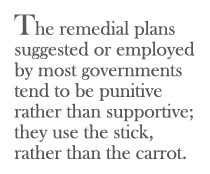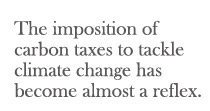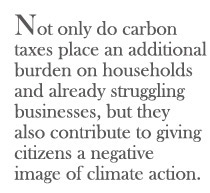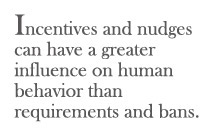More Carrot and Less Stick Needed to Fight Global Warming
More Carrot and Less Stick Needed to Fight Global Warming

NEW HAVEN: With less than 45 days to go until the climate change conference in Copenhagen in December, the need to tackle climate change is ever more pressing. Planet Earth has a fever, and if no immediate and strong action is taken, we will all bear the dramatic consequences of our negligence and recklessness. Unfortunately, the remedial plans suggested or employed by most governments tend to be punitive rather than supportive; they use the stick, rather than the carrot.
Primary among the stick approach is the use of national carbon taxes. The last country to have decided to introduce such a tax, following the examples set by Canada, Finland, Sweden, and a few other European countries, is France. Ignoring the outcry sparked by the possible imposition of such a tax, the French government announced in September a national carbon tax on emissions of Euro 17 per ton of carbon. Carbon taxes are now at the top of the hit parade of climate measures. The carbon tax frenzy has spread to Europe as a whole. On October 2, the Ministers of the 27 EU member states evoked for the first time the idea of an EU-wide carbon tax.

The imposition of carbon taxes to tackle climate change has become almost a reflex. Their simplicity and effectiveness make them an attractive tool. However, relying too heavily on a stick policy, without making use of the carrot, is not only insufficient, it could, in the current context of economic crisis, do more harm than good. Not only do carbon taxes place an additional burden on households and already struggling businesses, making it more difficult for industry to maintain its competitiveness, but they also contribute to giving citizens a negative image of climate action. They create a perception of climate change as a burden. No wonder that in spite of all the talks about the necessity to change our behaviors, citizens around the world have so far shown little eagerness to adjust. For most people, addressing climate change is synonymous with restrictions and additional costs.
True, the costs of combating climate change will be high. According to the United Nations Framework Convention on Climate Change (UNFCCC), they could reach US$250 billion per year by 2020. However, the transition to a low-carbon economy will also open many opportunities. The 2006 Stern Review on the Economics of Climate Change had anticipated a growth of markets for low-carbon energy products to US$500 billion by 2050. (Click here to see a discussion of the Stern Report) reality has exceeded the most optimistic expectations. In 2008, revenues from climate-related businesses rose by 75% to US$530 billion and there are estimates that they could exceed $2 trillion by 2020. Climate change is not only about costs, sacrifices, constraints and penalties. It also offers prospects of growth across a wide range of products and services.

China has understood the growth potential of combating climate change better than anyone else. While it drags its feet about committing to specific emissions targets, it is going green by actively promoting the manufacturing of solar panels and wind turbines. Thanks to Suntech and its ambitious CEO Shi Zhengrong, China is now the world's biggest manufacturer of solar cells, and it is expected to become the leading nation for wind turbine production this year. At this pace, China could out-green us all before we even realize it.
To seize the opportunities that the fight against climate change offers, an approach that encourages the development of clean technologies, removes barriers to their adoption, and promotes behavioral changes is essential, perhaps optimal.

While most of the technology needed to curb CO2 emissions already exists, further investments in R&D and enhanced access to finance are necessary to improve the production and efficiency of green technologies and to market them. The needs are colossal. In his 2006 report, prominent British economist Nicholas Stern called for a doubling of the support for energy R&D and an increase up to five-fold of the support for deployment of new low-carbon technology. The recent financial crisis that shook the world has helped scale up financial support. Economic recovery plans with significant green components have flooded the markets with fresh money, in particular in the US and China. Europe, however, is lagging behind, dragged down by its member states. While more than 60 percent of the EU’s stimulus package is green, when member-states funds are taken into account, the green component falls to less than 10 percent. Compared to the US and Japan, Europe also suffers from a chronic shortage of venture capital, which is essential to turn innovations into marketable products. Calls for the establishment of a EU integrated venture-capital market are growing louder.
Price signals are powerful instruments, but not only when the trend is upward. Incentives and nudges can have a greater influence on human behavior than requirements and bans. Tax breaks, for example, have the power to significantly boost innovation and the adoption of clean technology. Reducing tariffs on environmental goods and liberalizing environmental services would also go a long way in supporting the dissemination of green technologies. A breakthrough in the half-dead negotiations on environmental goods and services conducted within the Doha round of negotiations would benefit us all.

Finally, nudges are particularly efficient tools when it comes to influencing individual behaviors. One method might include giving individuals a method to monitor their own consumption patterns with feedback that shows how adopting an environmentally friendly behavior can generate substantial savings. But governments also need to do a better job of communicating to citizens these savings opportunities and of putting in place smart mechanisms to facilitate behavioral change. According to a recent study by the consulting firm McKinsey, the general use of “smart devices” incorporated into household appliances, or displaying the general level of consumption of a household, could reduce global CO2 emissions by as much as 15 percent by 2020.
An experiment conducted in California a few years ago also showed that the use of emoticons on electricity bills – e.g. a frowning face in the case of growing consumption or consumption above the average – led to substantial energy savings. Some creativity could do a lot for Planet Earth. The European Community, which is resolutely taking the lead on climate action, has understood this. It just announced the introduction of smart metering systems in households and offices by 2012. Given the considerable level of energy waste in developed countries, particularly in the US, let’s hope others will soon follow suit.
Climate change is the challenge of our time. Muscular policies are required to generate behavioral change but are not a panacea. In designing climate action, a good dose of incentives and nudges could considerably speed up the move to a low-carbon economy. Applying the stick may prove necessary to make people march, but only the carrot will make them run.
Emmanuelle Ganne is a 2009 Yale World Fellow and a Counselor at the World Trade Organization. These views are her own, and should not be attributed to the WTO.